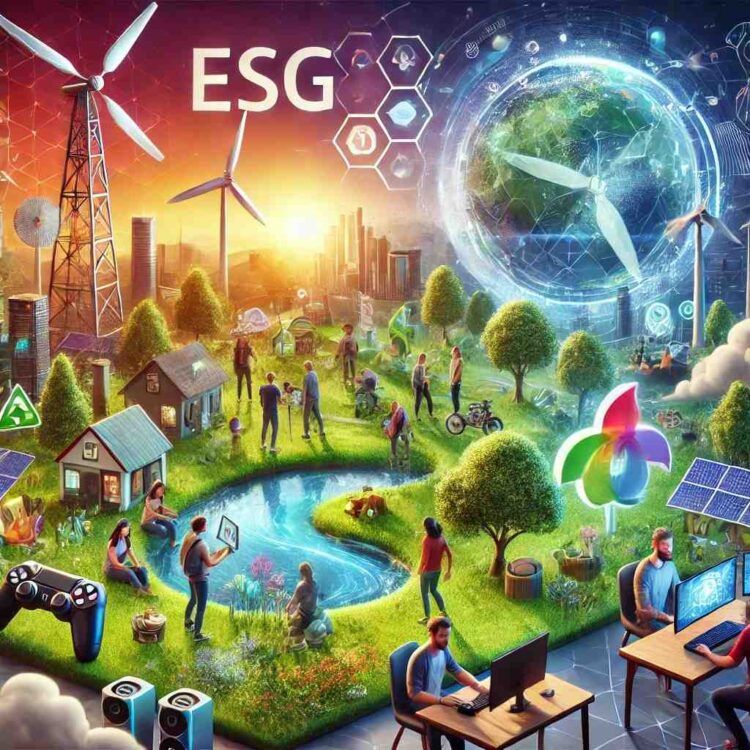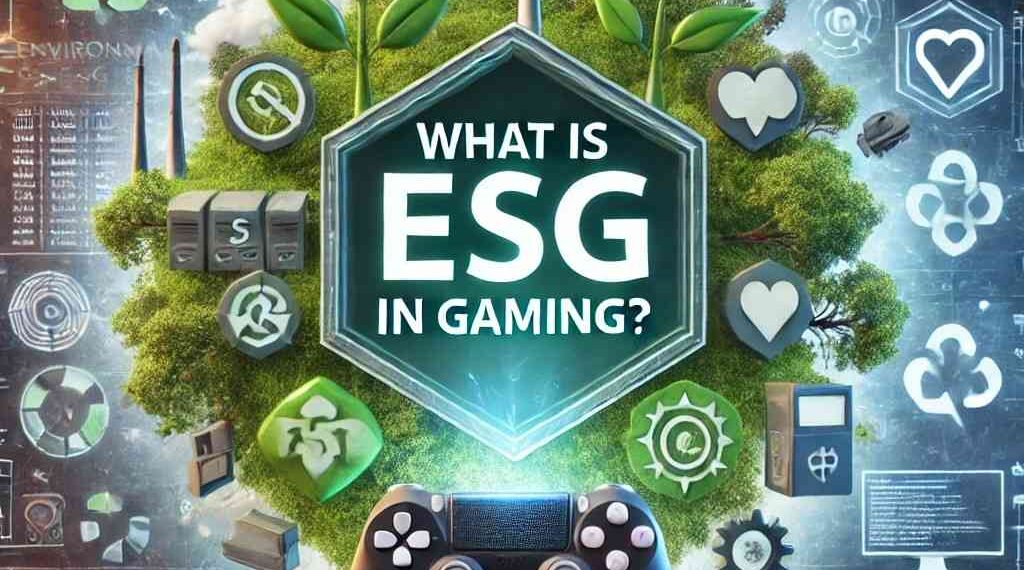Gameynix.com might contain affiliate links from amazon.com, so that we might earn referral commissions for each qualified purchases. It helps us to keep this website active and motivates us to make more valuable contents for visitors.
Table of Contents
ToggleIntroduction
In recent years, the gaming industry has been rapidly evolving, not only in terms of technology and graphics but also in its approach to sustainability and social responsibility. Ever heard of ESG? Short for Environmental, Social, and Governance, ESG is becoming a buzzword across many industries, and gaming is no exception. But what is ESG in gaming? In this article, we’ll dive deep into this concept and explore why it’s becoming essential in today’s gaming landscape, especially for environmentally conscious gamers, developers, and stakeholders.
What is ESG in Gaming?
The term ESG is widely used to describe a company’s commitment to responsible practices in three key areas: Environmental, Social, and Governance.
So, what exactly is ESG in gaming?
- Environmental: This involves efforts to reduce the gaming industry’s carbon footprint, from energy-intensive data centers to eco-friendly console manufacturing.
- Social: Social factors focus on promoting inclusivity, fairness, and safety in gaming spaces.
- Governance: Governance tackles transparency, ethical business practices, and responsible monetization.
When we ask, “what is ESG in gaming?” we’re asking how gaming companies address these areas to create a positive impact on players, society, and the planet.
Why is ESG Important in Gaming?

The gaming industry has a vast influence, with millions of players worldwide. Understanding what ESG is in gaming is essential for gamers who care about the environment, social equity, and ethical business. Here’s why ESG is crucial in the gaming world:
- Environmental Impact: With cloud gaming and digital downloads rising, gaming has an increasing carbon footprint.
- Social Responsibility: Games are social platforms that influence player behavior, often promoting either positive or negative social interactions.
- Ethical Governance: Trustworthy governance ensures that gaming companies are transparent, protect user data, and promote responsible spending.
In understanding what is ESG in gaming? it becomes clear that adopting these principles can lead to a healthier, more sustainable gaming industry.
The Environmental Aspect of ESG in Gaming
How Does Gaming Impact the Environment?
From high-energy data centers to electronic waste, gaming has several environmental effects. But what is ESG in gaming? doing to counter these impacts? Let’s explore.
- Energy Consumption: Gaming servers require immense energy, and with the growth of cloud gaming, this demand is rising.
- E-Waste: Gaming consoles, controllers, and accessories contribute to e-waste, with many products ending up in landfills.
- Resource Extraction: Materials like lithium and rare metals used in consoles have environmental costs.
How Are Gaming Companies Tackling Environmental Issues?
Many gaming companies are embracing ESG principles to reduce their environmental impact. Here are some initiatives:
- Renewable Energy: Some companies are powering their data centers with renewable energy sources.
- Eco-Friendly Packaging: Reducing plastic and using recyclable materials for game packaging.
- Sustainable Manufacturing: Efforts to use sustainable materials and extend the life cycle of gaming devices.
The Social Aspect of ESG in Gaming
How Does Gaming Influence Society?
Understanding what is ESG in gaming? also means recognizing its role in social impact. Gaming is now a significant part of social interaction, impacting mental health, inclusivity, and even societal norms.
- Player Behavior: Games can both positively and negatively affect mental well-being, influencing player behavior through community interactions.
- Diversity and Inclusion: The representation of diverse cultures and gender equality in games can have a huge social impact.
- Mental Health: Many gamers struggle with issues like screen addiction, and companies are beginning to implement features that support mental health.
Social Initiatives in Gaming
Many gaming companies have begun initiatives to address these social issues, such as:
- Anti-Harassment Policies: Tools and reporting systems to protect players from harassment.
- Inclusion of Diverse Characters: Ensuring representation across gender, ethnicity, and culture.
- Player Well-being: Implementing features like screen-time reminders or wellness check-ins.
Governance in ESG: Ensuring Ethical Practices in Gaming
What Does Governance Mean in Gaming?
When we ask, “what is ESG in gaming?” governance is a crucial aspect, focusing on transparency and ethical business practices.
- Data Privacy: With the vast amount of user data in gaming, data security is essential.
- Fair Monetization: Ensuring that in-game purchases are fair and don’t exploit vulnerable players, particularly younger audiences.
- Transparent Operations: Gaming companies need to adhere to legal standards and be transparent with stakeholders.
Governance Initiatives in the Gaming World
Here’s how some companies ensure good governance in gaming:
- Regulatory Compliance: Companies work to comply with international data protection laws like GDPR.
- Responsible Spending Tools: In-game tools that help players manage and monitor spending.
- Clear Communication: Transparent patch notes, community feedback, and bug fixes.
Comparing ESG Practices Across Popular Gaming Companies
Environmental Initiatives: Renewable energy in data centers, eco-packaging
Social Initiatives: Diverse character representation, anti-bullying
Governance Policies: Compliance with GDPR, responsible ads
Environmental Initiatives: Energy-efficient console design, zero-waste goals
Social Initiatives: Inclusion features, diversity in games
Governance Policies: Transparency on spending, ethical sourcing
Environmental Initiatives: Sustainable hardware, recycling programs
Social Initiatives: Parental controls, well-being alerts
Governance Policies: Ethical monetization, data privacy
This table highlights how these companies answer what is ESG in gaming? by prioritizing environmental, social, and governance practices.
Benefits and Drawbacks of ESG in Gaming
Benefits of ESG in Gaming
Implementing ESG in gaming brings numerous benefits, including:
- Positive Brand Image: Companies gain loyal fans by aligning with ESG values.
- Environmental Impact Reduction: Lower energy use and reduced waste benefit the planet.
- Healthier Community: Anti-harassment and well-being initiatives create a safer space for players.
- Transparency and Trust: Ethical governance builds player trust.
Drawbacks of ESG in Gaming
While beneficial, ESG practices also face some challenges:
- Cost of Implementation: Sustainable practices often come with higher costs.
- Balancing Profit with Responsibility: Striking a balance between revenue and ethical practices can be challenging.
- Technological Limitations: Achieving sustainable solutions for high-performance gaming hardware is complex.
Understanding what is ESG in gaming? involves weighing these pros and cons as companies work toward sustainable, responsible solutions.
Future of ESG in Gaming: What Lies Ahead?
The future of ESG in gaming looks promising, with more companies adopting these practices. But what is ESG in gaming likely to look like in the coming years?
- Increased Environmental Goals: More companies may aim for carbon neutrality and eco-friendly practices.
- Enhanced Social Responsibility: We may see more diversity in games, anti-bullying features, and mental health resources.
- Stricter Governance Standards: Companies could face stricter regulations to protect player data and ensure fair monetization.
With the growing awareness around ESG, the gaming industry is on the brink of a significant transformation.
Conclusion: Why ESG Matters in Gaming
So, what is ESG in gaming? It’s a vital framework that encourages gaming companies to prioritize the environment, create safe social spaces, and maintain ethical practices. For gamers who care about the planet, society, and fair play, ESG represents an essential shift towards a responsible future for gaming.
As gaming continues to expand and evolve, ESG can shape a more sustainable and inclusive gaming experience. Whether you’re a casual player, an eco-conscious gamer, or someone interested in ethical gaming, understanding what is ESG in gaming? helps you appreciate the industry’s commitment to a better world.






